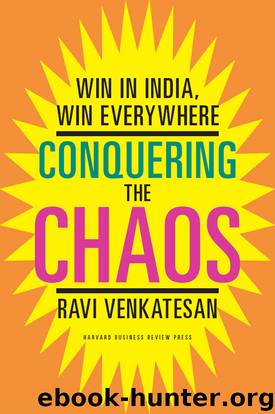Conquering the Chaos: Win in India, Win Everywhere by Ravi Venkatesan

Author:Ravi Venkatesan [Venkatesan]
Language: eng
Format: epub, mobi
ISBN: 9781422184318
Publisher: Harvard Business Review Press
Published: 2013-06-17T16:00:00+00:00
HR: The Toughest Shoes to Fill
Leading an organizational transformation is impossible without the expertise of a superb human resources leader. However, most HR professionals in multinational companies are managers, immersed in tactical issues such as compensation and benefits, overwhelmed by the challenges of staffing and retention, and mechanically implementing global processes and policies thrust on them by the global headquarters. It is rare to find an HR leader who, in addition to being functionally competent, has a good understanding of the business he supports and has developed an internal network. Not infrequently, the HR head in India is seen as a political power center, that is, as someone with the power to make or break a career, to be feared rather than trusted. That’s less an indictment of the innumerable competent and hardworking HR professionals in the country and more a reflection of what companies demand of them.
Leading the HR function requires more than ensuring that there are butts in seats, hiking wages constantly, and providing Thai foot massages and gourmet food in company cafeterias. Transformational HR leaders differ from their competent counterparts in three ways: they are grounded in the business, they take a long-term approach, and they are courageous. They push leaders to focus on the people agenda, even as they push back on corporate HR to do what makes sense in India.
It may sound trite, but good HR leaders care about employees. They have to connect with people on the front line and have their fingers on the pulse of the organization. In a widely circulated article, Ram Kumar, the executive director (HR) of ICICI Bank, lamented “the decadence of our thinking, from engaging and relating to people to managing human resources. We are obsessed with high-sounding concepts, processes, tools, and metrics, but have lost sight of the human being … This resource management piece has to be substituted by a people relationship focus.”6 Added another senior HR leader: “The HR profession does need to reflect on why it is so criticized. Does it have empathy with people or has it got caught up in processes and paperwork? Indians grow up in a caring environment at home and expect somewhat similar treatment at work. HR is expected to be a torchbearer of employee issues but has neglected that aspect by becoming mechanical.”7
A multinational company’s HR leader in India must take guidance but have the courage to do only what is right for the local organization. That means implementing compensation and benefits that make sense in India and fighting for designations and titles that matter locally. Rather than implementing the global blueprint with narrow, fragmented roles and multiple reporting lines, creating a locally relevant structure with big jobs will help attract talent and grow leaders. This is critical because multinationals increasingly compete with Indian companies for top talent. Even Hindustan Unilever, traditionally a magnet for talent, has had trouble retaining good leaders because “jobs at HUL are becoming more functional and narrow,” reported the Economic Times quoting a senior executive.
Download
Conquering the Chaos: Win in India, Win Everywhere by Ravi Venkatesan.mobi
This site does not store any files on its server. We only index and link to content provided by other sites. Please contact the content providers to delete copyright contents if any and email us, we'll remove relevant links or contents immediately.
Hit Refresh by Satya Nadella(9133)
The Compound Effect by Darren Hardy(8966)
Change Your Questions, Change Your Life by Marilee Adams(7780)
Nudge - Improving Decisions about Health, Wealth, and Happiness by Thaler Sunstein(7706)
The Black Swan by Nassim Nicholas Taleb(7129)
Deep Work by Cal Newport(7083)
Rich Dad Poor Dad by Robert T. Kiyosaki(6632)
Daring Greatly by Brene Brown(6513)
Principles: Life and Work by Ray Dalio(6447)
Playing to Win_ How Strategy Really Works by A.G. Lafley & Roger L. Martin(6304)
Man-made Catastrophes and Risk Information Concealment by Dmitry Chernov & Didier Sornette(6019)
Big Magic: Creative Living Beyond Fear by Elizabeth Gilbert(5771)
Digital Minimalism by Cal Newport;(5764)
The Myth of the Strong Leader by Archie Brown(5507)
The Slight Edge by Jeff Olson(5417)
Discipline Equals Freedom by Jocko Willink(5389)
The Motivation Myth by Jeff Haden(5212)
The Laws of Human Nature by Robert Greene(5208)
Stone's Rules by Roger Stone(5087)
